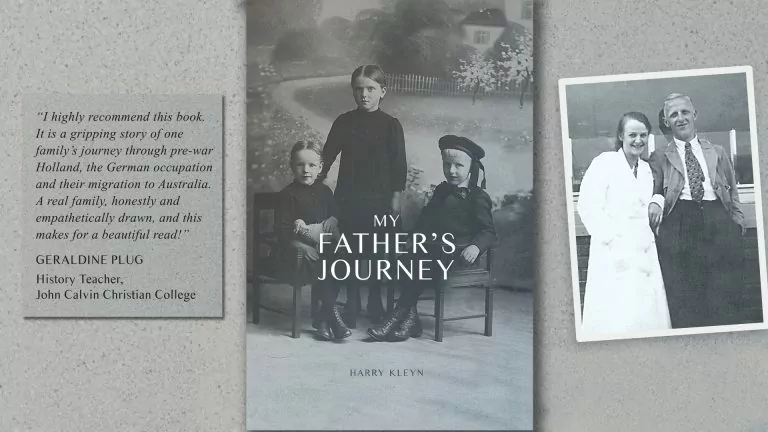by Harry Kleyn
2022, 411 pages
A few years ago I was asked to teach a North American church history course at Covenant Canadian Reformed Teachers College. As part of that, I spent some time teaching about the history of Dutch immigration to Canada. That’s always interested me, especially because of the stories I’d hear from my Opa Bredenhof. While I don’t think he ever regarded Australia as an option, many others did. I’ve often wondered: what if…?
That’s part of what made Harry Kleyn’s My Father’s Journey such a fascinating read for me. Being familiar with stories of post-war immigration from the Netherlands to Canada, I was really interested to hear what it was like to migrate to Australia. Working with interviews, diaries, and other sources, Kleyn pens a compelling story of the challenges before, during, and after immigration.
Lived through two world wars, a Great Depression, and a Liberation
We hear the story of his father’s life and family background in the Netherlands. I don’t want to spoil the story for you, but it’s surprisingly intense. Having been born in 1913, Cornelis Kleijn also lived through the First World War, the Great Depression, and the Second World War. All of those world events figure into the story, but especially the last one. Being of working age, and having served in the Dutch army before the invasion in 1940, Cornelis Kleijn was exactly the kind of man the Nazis wanted to send to Germany as slave labour. How did he escape? Read the book to find out.
These were also eventful years in church history. In the middle of the Second World War, a doctrinal and church political dispute was playing out in the Reformed Churches of the Netherlands. Calls to set the dispute aside until the end of the war were ignored by those in power. This led to the Liberation (Vrijmaking) of 1944. We read of how Cornelis Kleijn and his wife Willempje found themselves with that Liberation.
After the Second World War, the Netherlands was a disaster zone. The economy was in shambles. The Dutch government urged citizens to migrate overseas to reduce the pressure. Countries like Canada and Australia were eager to receive Dutch immigrants. Canada was out of the question for Cornelis and Willempje Kleijn – too cold! South Africa was considered, but Australia was for them the best option. Our author relates the story of packing up, saying good-bye, and enduring the long sea voyage to Fremantle, Western Australia.
New country, climate, and language, same faithful God
Having arrived in Australia, there were new challenges to overcome. There was a new culture, a new language, a new work environment, and a new climate. Many families, including the Kleijns, experienced setbacks. There were various difficulties in church life and Harry Kleyn is forthright about them, but in a respectful manner. In later life, the elderly Cornelis and Willempje Kleijn continued to experience various adversities in their family.
The whole story is one of trying times. I remember visiting with an elderly parishioner once who told me he was so thankful because there’d never been any deaths in their family and never any serious illnesses or problems. Everything had gone smoothly in life. That’s not the Kleijn family as described in this book. This is a family who experienced real hardships. But more than that, what stands out in the story is how God carried them through. With his Holy Spirit, he sustained their trust in him. This is a story of how God lifts up his people in their faith and brings them through the fires.
One final thing I appreciated about My Father’s Journey: even though the focus is on Cornelis Kleijn, his wife Willempje isn’t just in the background. Her diary entries and letters are often quoted (in translation). We hear of her frustrations at trying to master English, something she was never able to do. We hear of how hard it was to give birth in a hospital in a foreign land. We hear of the difficulties in keeping a house and raising children when your husband is gone most of the day trying to earn a living. It’s good to hear more about the experience of women in post-war Dutch immigration, especially via first-hand accounts.
This is a well-written and well-researched family biography. I highly recommend it, not only for those with an interest in the history of Dutch migration, but also for anyone who just wants to read an encouraging story about how God upholds his people through the toughest times. Even though it’s not a short book, I read it in just a couple of days and I’m sure you’ll find it to be just as captivating as I did.
My Father’s Journey is available through most major online retailers.













